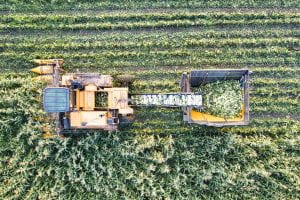 At the University of Bristol Business School, we recognise the importance of sustainability and embed this into our research, helping to tackle global challenges affecting businesses and society today. Here is a round-up of some of the sustainability related research of some of our academics:
At the University of Bristol Business School, we recognise the importance of sustainability and embed this into our research, helping to tackle global challenges affecting businesses and society today. Here is a round-up of some of the sustainability related research of some of our academics:
The Impact of Green Credit on Firms’ Green Investment Efficiency: Evidence from China
 Li, L., Qiu, L., Xu, F. & Zheng, X., 1 Jun 2023, In: Pacific-Basin Finance Journal. 79, 17 p., 101995. – Fangming Xu
Li, L., Qiu, L., Xu, F. & Zheng, X., 1 Jun 2023, In: Pacific-Basin Finance Journal. 79, 17 p., 101995. – Fangming Xu
Researchers studied how green credit affects the green investment efficiency of 588 Chinese green companies from 2009 to 2019. Their results have shown that green credit can improve a company’s green investment efficiency, especially for state-owned enterprises and those in high-growth industries. Corporate governance, innovations, and financial constraints were also shown to moderate the positive impact of green credit on green investment efficiency. This research provides new evidence that emphasises the importance of green credit in stimulating corporate green investment efficiency in China.
Framings of Innovation, Responsibility, and Responsible Innovation in China: insights from a case study undertaken with Chinese businesses
Li, F. & Owen, R., 22 May 2023, (Accepted/In press) In: Journal of Responsible Innovation. – Richard Owen

Responsible Innovation (RI) has gained attention globally in both academic and policy circles, however few studies have explored how RI is framed in China compared to in the West. This research looked to address this gap by studying companies located in China and the findings suggest that framings of innovation and responsibility in China are underpinned by a mixture of logics and institutional entrenchments that are heavily influenced by the norms, policies, and ideology of the State. The paper also reflects on how these Chinese perspectives intersect with Western ideas of RI and how they might impact RI’s development in China in the future.
Environmental Disclosure and the Cost of Capital: Evidence from the Fukushima Nuclear Disaster

Bonetti, Pietro., Cho, C. H. & Michelon, G., 21 May 2023, (E-pub ahead of print) In: European Accounting Review. – Giovanna Michelon
In this study of Japanese companies, researchers examined how sharing environmental information impacts a company’s cost of capital, before and after the Fukushima nuclear disaster, as environmental information is argued to have become more relevant to investors after the disaster. They found that firms disclosing carbon emissions experienced a lower increase in the cost of capital than non-disclosing firms with the association thought to be driven by the increase in investor uncertainty about the energy supply shortage following the disaster.
A governance approach to stakeholder engagement in sustainable enterprises – evidence from B Corps

She, C. & Michelon, G., 17 Apr 2023, (E-pub ahead of print) In: Business Strategy and the Environment. 19 p. – Giovanna Michelon
Corporate governance can help balance the tension between financial sustainability and mission for impact in sustainable businesses, by guiding stakeholder engagement. This study explored how governance in sustainable businesses influences their interaction with stakeholders on social media. Researchers identified three key governance mechanisms: legal commitment to a purpose beyond profit, directors’ dedication to the mission, and specific accountability methods. The findings, based on the analysis of tweets from U.S. B Corps, showed that legal and ethical mechanisms positively impact engagement quality, while accountability mechanisms influence both the extent and quality of engagement. This research highlights the role of governance in shaping social media interactions for sustainable enterprises.
Production and consumption in agri-food transformations: rethinking integrative perspectives

Beacham, J. D. & Evans, D. M., 14 Apr 2023, In: Sociologia Ruralis. 63, 2, p. 309-327 19 p. – Jonathan Beacham and David Evans
Calls for fundamental changes in agri-food systems, driven by concerns about public health and environmental sustainability, have intensified across research and policy domains, with the relationship between food production and consumption appearing as a key issue. This study looks to build on previous efforts to bring consumption and consumers into agri-food scholarship. The study’s analysis focuses on the case for alternative proteins and highlights three key areas: the geographies of edibility, the economy of qualities and visceral politics, that offer potential for updating perspectives on integrating production and consumption. The researchers also look at the theoretical and practical risks of seeking to reconcile ‘production’ and ‘consumption’
Towards Sustainable Consumption: Reflections on the Concepts of Social Loading, Excess and Idle Capacity

Southerton, D. & Warde, A., 2023, Consumption, Sustainability and Everyday Life. Hansen, A. & Nielsen, K. B. (eds.). Palgrave Macmillan, p. 339 362 p. – Dale Southerton
In this paper, the researchers examine the unsustainable levels of everyday material consumption currently occurring in the West, and the principle of ‘just-in-case’ as a justification for the tendency of individuals and organisations to keep or increase excess capacity. With current strategies for reducing material consumption proving insufficient, this study identifies instances where ‘just-in-case’ reasoning is leading to increased production and overstocking, and proposes four ways to reduce the environmental impact of certain goods. These include alternatives such as sharing and renting services for under-utilised resource-intensive products and potential opportunities from digital technologies.
An appetite for change? Engaging the public in food policy and politics

Beacham, J. & Jackson, P., 1 Nov 2022, In: Consumption and Society . 1, 2, p. 424–434 11 p. – Jonathan Beacham
This research focuses on the challenges associated with incorporating a diverse range of voices within the evidence base for the National Food Strategy (NFS) report – an Independent Review of England’s agri-food systems, commissioned by the Department for Environment, Food and Rural Affairs (Defra) and published in 2020/21. The researchers have examined the NFS’ public engagement strategy, which included running a series of public dialogue events, and identified key issues with the strategy, namely: the variety of subject positions and politics at play and different forms of knowledge used in the process of public engagement.
Environmental Performance Feedback and Timing of Reshoring: Perspectives from the Behavioural Theory of the Firm

Zhang, M., Shui, X., Smart, P. K., Wang, X. & Chen, J., 11 Oct 2022, (Accepted/In press) In: British Journal of Management. – Minhao Zhang, Xiaolong Shui and Palie Smart
In this paper, the researchers looked specifically at how sustainability performance feedback influences reshoring decisions for multinational manufacturing firms. Focusing on publicly traded companies from 15 developed countries, the study revealed that firms with below-aspiration environmental performance are slower to reshore, while those with above-aspiration performance do so more quickly. Positive financial performance feedback was also seen to have a moderating role in some instances, further delaying reshoring for firms with lower environmental performance. The role of this has not been confirmed though in the relationship between higher environmental performance and the timing of reshoring.
Find out more about research at the University of Bristol Business School.

